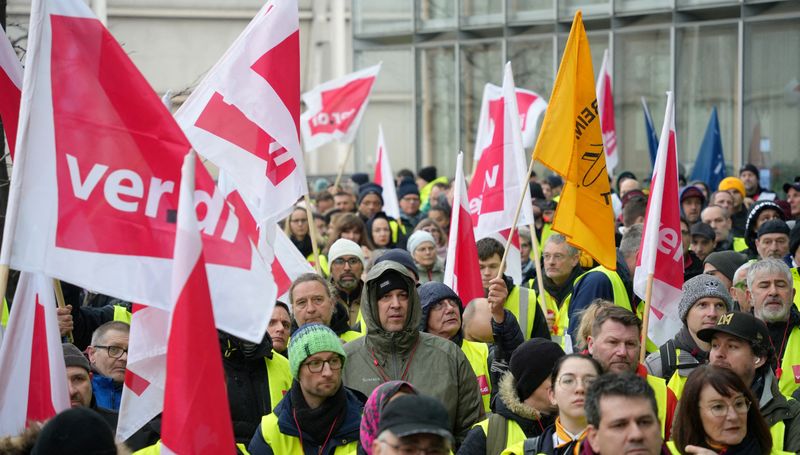By Joanna Plucinska and Ilona Wissenbach
LONDON/FRANKFURT (Reuters) - Lufthansa will likely miss its 2024 profit margin goal as the German airline seeks to agree new, higher pay deals to end prolonged strikes, which have forced it to cancel thousands of flights, analysts and investors say.
The carrier's shares have been among the best performers compared with rival European flag carriers, Air France-KLM and IAG, as the region's travel industry has recovered from the devastating COVID-19 pandemic which shut borders and grounded planes around the world in 2020.
In 2021, the German group presented an ambitious plan to return to profit, including a target for adjusted earnings before interest and taxation (EBIT) margins of at least 8% and adjusted return on capital employed (ROCE) of at least 10% in 2024.
But many airlines have struggled with recruitment efforts as staff from baggage handlers to cabin crew have left the sector. Spiralling energy and food costs have also fuelled inflation.
As a result, carriers have agreed big pay rises in recent years to attract workers.
Lufthansa's ongoing labour disputes and service disruptions have put those profit-margin goals in jeopardy.
Adjusted EBIT margins will fall to 6.9% this year from an estimated 7.4% in 2023, according to a company-provided analyst poll. The airline may lower that target when it releases 2023 results on March 7.
Lufthansa declined to comment ahead of its earnings report.
Wages will also be in focus as rivals Air France-KLM and BA-owner IAG report 2023 earnings on Thursday.
But Lufthansa is more vulnerable to costly labour disputes, analysts say.
"We think Lufthansa is facing greater challenges from industrial relations than its European peers, as a result of the broad industrial relations climate in Germany," said Barclays analyst Andrew Lobbenberg.
Last year's deal with pilots cost Lufthansa an additional 700 million euros ($756.98 million) until 2026, while cabin staff will vote March 6 on strike action as they seek a 15% wage hike, a potential harbinger of further profit erosion.
German groundhandlers downed tools this week, demanding a 12.5% wage rise of at least 500 euros per month over 12 months, plus a one-time payment of 3,000 euros.
Union Verdi, representing about 25,000 staff, said the company's offer of more than 10% does not compensate for inflation during the pandemic.
Lufthansa says it was ready to talk but has not made a new offer.
Last week's unexpected news that Chief Financial Officer Remco Steenbergen, who is well regarded by investors, will leave in March hurt investor confidence further, analysts said.
The shares fell 3.6% on the news on Friday.
"This increases the risk that the target of a return of at least 8% that he has set will now be reduced or postponed to the future," said Stefan Maichl, an analyst at LBBW.
REALISTIC OUTCOMES
Struggles with capacity in Asia, the slow recovery of business travel and ongoing engine issues have also weighed on growth prospects, casting doubt on profit goals.
"Lufthansa has to confront a new world with less corporate travel in it - the highest-yielding passengers, and a good 40% of pre-pandemic passenger revenue," said Alex Irving, an analyst at Bernstein.
Lufthansa aims to mitigate rising labour costs with newer airlines, including Discover Airlines for leisure customers and City Airlines for flights in Germany. Both will have substantially lower costs than the main Lufthansa carrier.
The carrier is also upgrading its premium product to attract higher-paying business customers lost after the pandemic.

"When it comes to labour costs, Lufthansa as a premium airline will have to accept significantly higher wages for qualified staff in order to ensure high service quality," said Patrick Schuchter, a fund manager at Union Investment, and among Lufthansa's dozen biggest shareholders.
($1 = 0.9247 euros)